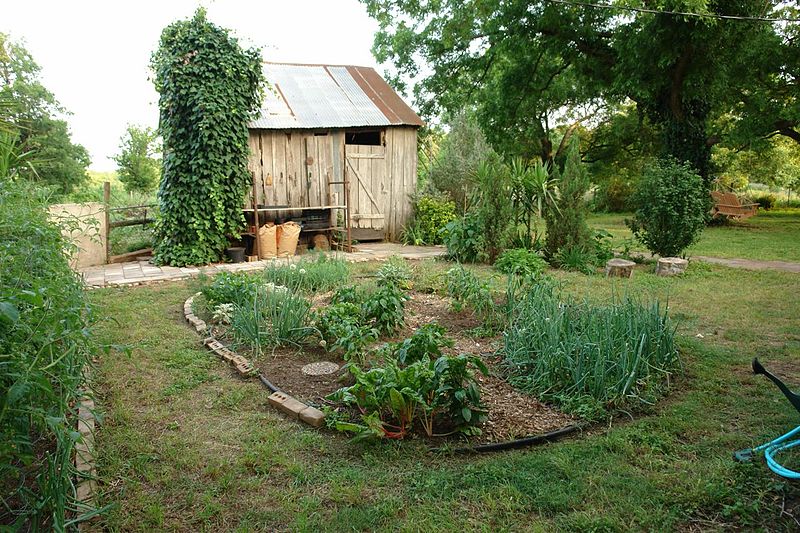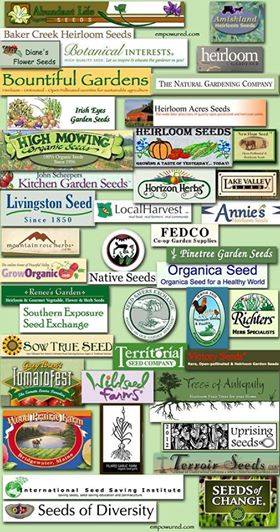Table of Contents[Hide][Show]

Seed catalogs for the upcoming growing season are arriving in mailboxes across the Northern Hemisphere with home growers everywhere starting to plan which seeds they will sow in freshly composted garden. A positive trend in recent years is the growing number of gardening enthusiasts choosing to plant gardens using organic and/or heirloom seeds.
What most of these home gardeners don’t realize is that corporate behemoth and GMO titan Monsanto has been gobbling up the seed market faster than a caterpillar can munch a tomato plant! With one fell swoop in 2005, Monsanto grabbed approximately 40% of the US vegetable seed market with its acquisition of Seminis.
This means that a home gardener could unknowingly be supporting the development and proliferation of genetically modified crops if the seeds used are from Seminis. In addition, Monsanto now apparently owns the trademark for many of the names of the heirloom seed varieties themselves!
Planting a sustainable home garden is much more than just choosing certified organic seeds and seedlings, eschewing pesticides/herbicides and using organic compost. This is because Monsanto has cleverly positioned itself to make money off the home gardening trend.
Does this mean that even if you buy organic or heirloom seeds from a completely independent company some of your purchase might be supporting the bad guys?
Yes, it does.
Surprise!
Home gardeners would do well to bone up on where to purchase their seeds so they aren’t inadvertently doing business with companies that maintain a working relationship with Monsanto-Seminis or were acquired by them.
Buying Organic or Heirloom Seeds Without Supporting Monsanto
Here are the recommended steps for the 2014 growing season for those who want to truly strike a blow for sustainability in every way with their home gardens:

Avoid buying from the seed companies affiliated with Monsanto. Here’s a list of these seed companies by location (enter you zipcode for a list of dealers to avoid).
- Buy from companies Monsanto HASN’T bought and are not affiliated or do business with Seminis: The graphic above indicates numerous companies that are worthy of your patronage as compiled by the International Seed Saving Institute. Please note that this many not be a complete list. If your seed company does not appear, just be sure to clarify with the owner about any potential affiliation with Monsanto-Seminis before buying from them.
- Avoid buying heirloom varieties for which Monsanto owns the trademark.
- Ask seed companies if they have taken the Safe Seed Pledge. Here’s a list of companies that have taken the Safe Seed Pledge and believe in responsible plant genetics. These are good companies to buy from.
Background on Monsanto’s Quest for World Seed Domination
Monsanto’s corporate quest is clearly to make money on each and every one of us whether we choose to eat supermarket frankenfoods produced with abominable, patented GM crops or carefully plant and tend an organic garden at home. Here’s some background information on the subject you may find interesting as well as enlightening:
If you are a home gardener and have information to contribute regarding these steps, please add to the discussion in the comments section. Also, please spread the word via gardening forums you may participate in that folks need to be very careful when seed sourcing for their spring gardens this year else they might be unknowingly supporting Monsanto.
Let’s make this the year when Monsanto’s grip on the worldwide seed market loosens and the movement to seed sustainability gains momentum!
Update
The day after this article was originally published in 2013, the CEO of a large GMO soybean seed company in the Midwest emailed me complaining that the article was short-sighted and insisting that Monsanto is helping feed the starving people of the world. He even went so far as to say that GMO crops are “proven safe”. Click here for the text of this CEO’s entire email plus my written reply.
I have also received email complaints from two other seed companies, one in Canada and one in Arkansas, that do business with Monsanto-Seminis and were offended by what they viewed as inaccuracies in the post. In response, I have adjusted the text slightly and moved linked sources to within the text rather than only listed at the end to make the message of the post as clear and precise as possible so as to not result in any consumer confusion over the information.
I have received no complaints about this article from seed companies completely independent of any affiliation or ties to Monsanto-Seminis.
More Information
Why I Avoid Organic Hydroponic Produce
The Hydroponic Invasion of USDA Organic
Heirloom vs Hybrid Produce
Photography Credit








This isn’t entirely correct. I am a seed-grower, and want to help clear things up a bit for folks.
Monsanto (Seminis) owns ONLY the names of the F1 hybrid varieties on this list, as these varieties are inherently proprietary — only they know the parental lines that were crossed to produce the F1. With few exceptions, every variety on this list is an F1 Hybrid. The open-pollinated varieties on this list (Black Beauty eggplant, Marketmore 76 cucumber, Habañero pepper, Hungarian Yellow Hot Wax pepper) are NOT owned by Monsanto. These varieties are grown and sold by countless independent seed companies (some of them by us as well), and trust me, Monsanto doesn’t get one red cent of royalties, as they do not own the names of these open-pollinated varieties.
These open-pollinated varieties are on this list because they are also grown by Seminis, NOT owned by Seminis. Seminis is one of many, many companies growing and selling these fine varieties that have stood the test of time.
If you want to empower yourselves when it comes to buying seed, get to know your seed source. Ask informed questions. Talk to your farmers and your seed-growers, and do your own research. Learn how to save seeds. The above list has been re-posted on many sites, and cited many times, spreading misinformation. I understand the desire to not support Monsanto in any way, as I share this desire!
Hope this helps…I’m happy to help answer folks’ questions on this issue if they feel so inclined to get in touch.
all the best,
Justin Huhn
Thanks for the message Justin. You are 100% correct.
Up here in Canada our climate does not allow for growing of quality seed in quantities required as a seed company. My grandfather tried to grow seed here in Ontario with disastrous results and that was back when the climate was predictable. In vast areas of Canada the weather today is opposite of tomorrow.
Best Regards,
Bill
Anyone who grows can also produce seed. Pioneers and homesteaders in upper Canada did it, and we can too. The key is, avoid seeds from the big corporations.
“Monsanto doesn’t get one red cent of royalties, as they do not own the names of these open-pollinated varieties.
These open-pollinated varieties are on this list because they are also grown by Seminis, NOT owned by Seminis. Seminis is one of many, many companies growing and selling these fine varieties that have stood the test of time.”
This is not entirely correct. ANYTHING sold by Seminis results in money going in the pocket of Monsanto because Seminis is OWNED by Monsanto. So, to purchase these open-pollenated varieties from someone OTHER than Seminis, if THEY did not obtain the seed from Seminis, will not result in money going to Monsanto. But if you purchase from Seminis or from a company that bought from Seminis, you most certainly ARE giving your money to Monsanto.
Wow! i got to this post late but if you go over to farmwars dot info you will see that BARB personally vetted this issue last fall. the post is under the SAFE SEED LADY NETWORK and she covered tons of seed companies all for the issues SARA highlighted. Many readers wrote in about their favourites and BARB sleuthed them out.
Check it out it is a momentous research project and she deserves HUGE kudos for her efforts to educate us on who to turn to to keep our food supply safe.
Stay safe, everyone!
Thank you for posting this info. I am trying to get my seed purchase together and would like to start trying to save seeds as well. Obviously, I don’t want to start out with the wrong thing.
These Monsanto seed articles always remind me of a book I read, “Season of the Harvest.” It is a lot more sci-fi, but the GMO and the seed control is spot on. (It’s free for kindle right now too.) I think it even simplifies the level of control.
Glad to see Peaceful Valley made this list! They’re truly the best of ALL worlds – non-GMO, mostly heirloom varieties and everything also certified organic. 🙂 Not many companies out there can claim that.
I’ll definitely keep them on my list. Thanks.
Just got a booklet in the mail from “Gurney’s.” Any info on them?
The yard in the pic is gorgeous! Looks so peaceful there!
I would like to know if it is possible to get GMOs out of you system once they are present in your body?
It doesn’t really work like that. Practically all vegetables are NOT genetically modified. Most of the wheat, corn, soy and cannola that are used in factory produced food is Genetically Modified. (unless it is 100% organic) GMO simply means Genetically Modified Organism. One answer is to NOT buy anything made in a factory. Crackers, Cereal, bread, canned food etc. Cook your own food with ingredients that you know are OK. I use organic wheat and do not use corn or soy at all, or cannola.
One type of genetic modification makes a plant such as soy able to take more weed killer. Another puts a gene in the plant that enables the plant to produce the Bt toxin which kills bugs that eat it. The Bt toxin DOES goes into your body when you eat the plant and there is a big question about wheather it hurts humans and other mammals, not just the bugs. Some people worry that the gene for Bt taxin could move to a bacteria that lives in your gut and aids digestion. I do not know more about that issue. But I would rather not eat the Bt toxin in any amount. If it causes damage in your body, most would heal if you quit using it although some problems might continue after the taxin has left your body. But the question of the gene being passed to your own bacteria is disturbing if it is possible.
Excellent information. Thanks.
I signed up for seeds of the month club from Mike the Gardener http://www.averagepersongardening.com he said his seed are GMO free. If his seeds are could you add him to the list.
Thank You
He is out of Burlington, NJ
I found this video very enlightening. Perhaps you will to.
http://youtu.be/KRDSSAXjsUY
Thanks for the video – he makes some real valid points.